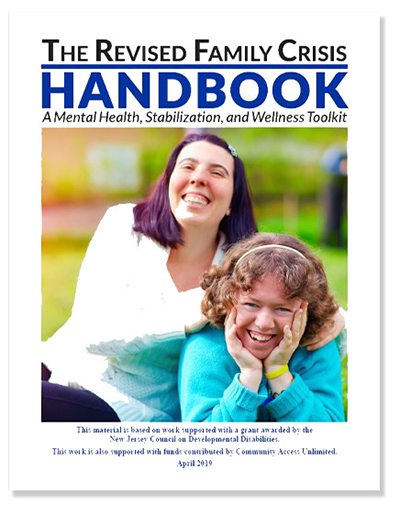
Free Family Crisis Handbook for families with loved ones with disabilities now available
When Donna Icovino watched as her 18-year-old son with autism and bipolar disorder was taken to a state psychiatric institute against her wishes, the long-time advocate for people with disabilities and dual diagnoses thought, “If this could happen to my son, what could happen to other families? I didn’t want what happened to my Michael to happen to anyone else.”
To help achieve that goal, Icovino and Dr. Lucille Esralew were retained by the nonprofit Community Access Unlimited (CAU) to develop “The Revised Family Handbook: A Mental Health, Stabilization and Wellness Toolkit,” a handbook designed to educate families with loved ones with disabilities and dual diagnoses and better help them navigate the social services support system.
CAU is a Union County-based, statewide nonprofit that strives to integrate people with disabilities and at-risk youth into the general community through comprehensive supports. The handbook was supported through a grant from the New Jersey Council on Developmental Disabilities to CAU, which also helped to fund it. A downloadable version of the handbook is available at CAU’s website at http://www.caunj.org under the Resources section.
Icovino is the former co-chair of the New Jersey Department of Human Services Dual Diagnosis Task Force and serves as a peer support counselor for the Rutgers University Behavioral Healthcare Mom2Mom Helpline. Esralew, with a doctorate in psychology, is the director of clinical services for the Redwood Coast Regional Center in Northern California and previously serviced as clinical administrator for two New Jersey mental health outreach programs while working at Trinitas Regional Medical Center.
“The Revised Family Crisis Handbook” includes:
- Information to help families navigate the often confusing social services support system for children with disabilities and their families
- Real-life stories from families, individuals with disabilities and support services professionals
- Advocacy tips
- Additional information and resources
The handbook is the outgrowth of a previous version Icovino and Esralew produced that focused on assisting families with adult loved ones with disabilities and dual diagnoses. When New Jersey separated state administration of support for children with disabilities from those for adults with disabilities in 2013, Icovino and Esralew new a new version of the handbook was needed.
“We needed to find a way to help families and their loved ones with developmental disabilities and dual disorders,” Esralew said. “There was misunderstanding and confusion.”
A dual diagnosis or disorder refers to an individual with both a developmental disorder such as Down Syndrome and a non-developmental disorder such as depression.
“The goal was to educate family members so they could make educated decisions for their loved ones with dual diagnoses,” Icovino said. “It’s about empowering families (to know) how to navigate the service system in the most efficient way.”
The real-life stories play an important role in that, Icovino added.
“You can’t just provide facts,” she said. “We wanted to let them know, ‘We understand how you feel.’”
The original handbook had a tremendous impact on families throughout the state, according to Esralew, and both she and Icovino are confident the second will be equally well received.
Today, far removed from that psychiatric institution, a 34-year-old Michael Icovino lives in a group home. According to Donna Icovino, he enjoys a wonderful social life, does community service such as Habitat for Humanity and food drives, participates in sports, including the Special Olympics, dances and no longer needs an anger-management plan.
“I know the positive outcomes that can be derived when you educate yourself,” Donna Icovino said.
To learn more about CAU, visit caunj.org or follow CAU on Facebook, Twitter and Instagram.
About Community Access Unlimited
Community Access Unlimited (CAU), celebrating its 40th year in 2019, supports people with special needs in achieving real lives in the community. CAU provides support and gives voice to adults and youth who traditionally have little power in society. CAU helps people with housing, life skills, employment, money management, socialization and civic activities. CAU also supports opportunities for advocacy through training in assertiveness, decision-making and civil rights. CAU currently serves more than 5,000 individuals and families, with the number served growing each year. For more information about CAU and its services, contact us by phone at 908.354.3040, online at caunj.org or by mail at 80 West Grand Street, Elizabeth, NJ 07202.
